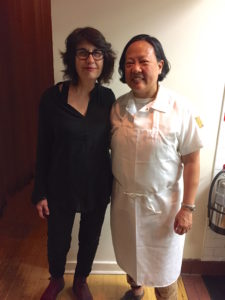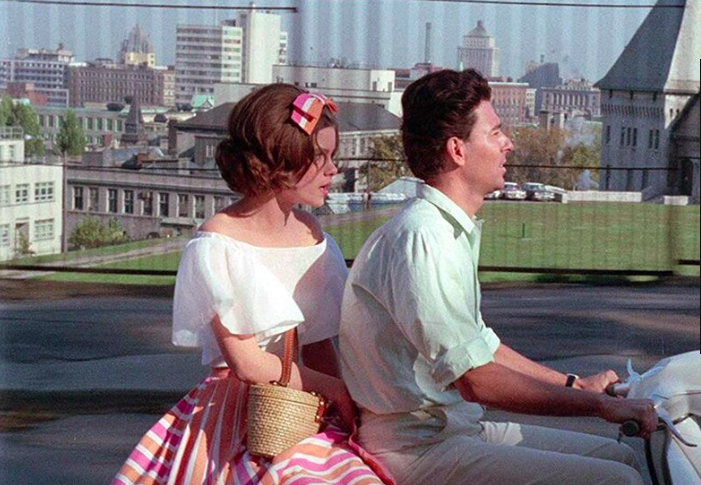Some chefs have achieved the status of film stars in today’s food obsessed culture. And most of them, weaponized by television and social media, are men. This weekend coming the Wakefield Doc Fest will feature a film by Canadian director Maya Gallus that does its level best to redress the gender imbalance. Gallus’s documentary shines a light on seven female chefs in New York City, London and Toronto and their personal and professional struggles. The Heat: A Kitchen (R)evolution opened the Hot Docs festival in Toronto and now will be screened Oct. 13 in the Wakefield Doc Fest’s weekend of films about food. Before the Wakefield screening Gallus answered some questions from ARTSFILE.
Q. Tell me a bit about your career in film?
A. I’ve been a filmmaker for more than 20 years, frequently exploring a woman’s experience, or “a female gaze” on screen. In 2003, I formed Red Queen Productions with my partner in life and art, Justine Pimlott, to make films with strong, positive female role models, and, often, LGBTQ subject matter, as what we saw being depicted was limiting and not particularly empowering. Last year I was honoured to have a mid-career retrospective of my work at Hot Docs Canadian International Documentary Film Festival, and this year The Heat: A Kitchen (R)evolution opened Hot Docs.
Q. How does The Heat fit into your thinking about film projects?
A. It’s part of a continuum. My intention is to shine a light on people or subjects that have traditionally been marginalized in order to educate, inspire and illuminate, and, ultimately, to effect change.
Q. Why did you make this film?
A. I made an earlier documentary called Dish: Women, Waitressing and the Art of Service, in which I explored the experience of being a female server in restaurants from North American truck stops and diners, to sexy restos in Montreal, to haute cuisine in Paris and, finally, fantasy maid cafes in Tokyo. As a result of that film, I became interested in the experiences of women, specifically chefs, working in restaurant kitchens. It was/is such a male-dominated field and I was intrigued by the irony that women have been cooking forever, but when it comes to being a respected profession women are largely excluded.

Director Maya Gallus and Chef Anita Lo.
Q. Food television, such the late Anthony Bourdain‘s show Parts Unknown, has changed my view of food television and food journalism. He did talk to female chefs in his shows, but he always travelled with men like Eric Ripert and Jose Andres. Does the power of male dominated TV skew our perception of the professional kitchen? Is that something you considered in making The Heat.
A. I admire Anthony Bourdain’s work, especially his book Kitchen Confidential, and his show, Parts Unknown, and I was impressed when, after the sexual harassment and abuse scandals started to be made public in the culinary industry, he publicly apologized for his part in having “contributed to meathead culture.” There’s no question, however, when I watch those shows, including David Chang’s Ugly Delicious, I’m shocked at how blatantly it’s all about the boys club.
Of course, that skews public perceptions. Television has a large reach — it both reflects and influences popular culture and, therefore, how we, as a society, view ourselves as well as others. I see part of my work as presenting an alternative view to an audience, to nudge them to look at their own biases and consider a different perspective.
Q. I used to watch the Iron Chef and other shows but I have grown tired of all that. Is the time for those shows past?
A. People love food and people love watching food being prepared. It’s very relaxing to watch those shows so I don’t think all of this will pass, but the need to feed the hungry beast of television means that the shows will get more extreme or, at its best, more layered — for example, combining different levels so it’s not just about one thing.
Q. Is cooking an art form? Are chefs artists?
A. Cooking is a very creative form of expression and, as such, some of the chefs practising this form are artists, some are artisans, some are highly skilled professionals and some are hacks. It’s usually pretty clear where someone fits on that continuum.
Q. The Gordon Ramsay style of kitchen management is frankly offensive. Is that real?
A. He’s become a caricature of himself, but he knows it, so there is a bit of a wink in there. He’s tough, and a yeller, but the ultimate point is that he expects rigour, precision and speed — all of which are needed in a restaurant. He was trained in bullying kitchens and, unfortunately, the abused often becomes the abuser. Thankfully, that is slowly changing.
Q. If it is real, and based on your work in Heat, why would anyone put up with it. I’m thinking here of Angela Hartnett, who is featured in your film.
A. Angela Hartnett said she kept her head down and focussed on the work. And, as she says, in the film, she just tried to get through a week without a “bollocking.” She had a sense of humour about it all and, also, took the long view. She knew it was a great experience and is grateful to Ramsay — he mentored and supported her career as a chef. Interestingly though, she’s very clear that although she sometimes gets angry, she’s not interested in yelling or bullying. A lot of people are finding it’s not the most effective way to run a kitchen.
Q. The male chef has dominated the TV face of cooking. Have women been changing the game on the front lines?
A. Any woman who has come up through the ranks has had to work extra hard to prove herself, as is true of any woman in any male-dominated profession. As a result, they understand what it’s like to be marginalized and often, humiliated so, thankfully, most women who run kitchens choose to run their kitchens differently than the old school ways. There may still be a hierarchy, but usually less ego, and the structure is less militaristic, less rigid and more open, with no bullying and shouting. Also, women tend to hire more women, which in turn automatically alters the atmosphere of the working environment as it’s not so male-dominated. Finally, women are also at the vanguard of trying to change the working conditions, in terms of the brutal hours and lack of medical benefits, so that the industry can be more hospitable to women who want to raise a family, rather than having to leave the profession because it’s just too tough.
Q. Is this change all positive?
A. Yes, I think creating more humane working conditions is all positive.
Q. Is The Heat making the festival roads?
A. The Heat just had its European premiere at the San Sebastian Film Festival in Spain, as part of the prestigious Culinary Zinema program. This week I am showing the film at Les Grands Tables du Monde, a convention of French restaurateurs from around the world who are dedicated to improving the world of gastronomy. Many more international film festivals to come. So far, audiences are incredibly receptive, and people tell me they are really inspired by the film, and very affected by its message.
The Heat: A Kitchen (R)evolution screens Oct. 13 at 7:30 p.m. For tickets and information about the weekend of film, please see wakefielddocfest.ca.







